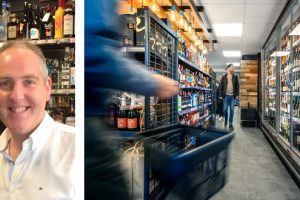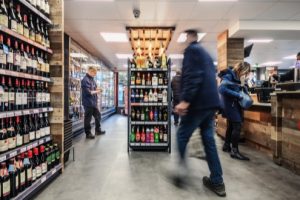But despite the many uncertainties as the UK economy begins to emerge from the Covid-19 crisis, the managing director of Bestway Wholesale is clearly optimistic about the future for local shops, which he says have been given an “unbelievable opportunity” to reconnect with shoppers thanks to their amazing response to the pandemic and the subsequent shift in customer habits.
“The retailers have been remarkable,” he says. “They have worked their socks off to support their local communities in their time of need and have been able to showcase their services to people who would not normally visit them. They have been real heroes.”
Tough start
With 62 warehouses around the country trading under the Bestway and Batleys banners, the wholesaler has clearly been at the forefront of the independent sector’s response to the coronavirus emergency. The business serves more than 100,000 retailers in total – whether through its cash and carries, Best-one symbol group, van sales operations or the Bestway Retail division, which encompasses some 630 stores under the Bargain Booze, Select Convenience, Central Convenience and Wine Rack brands. In the first few weeks, things were tough, Pervez concedes, as the wholesaler scrambled to adapt to the huge increase in demand and some suppliers diverted product to the multiples as images of empty supermarket shelves filled the news. The wholesaler was even faced with empty shelves itself on some occasions.
“We’re in a much better position now than we were,” Pervez says, “and we continue to see it improve day by day. Grocery, household, health and beauty and now beer have all been very difficult when it comes to getting the right products to the extent that we need them. But we have worked collaboratively with our suppliers and brought in all sorts of multi-packs and new formats. We have been very quick to do that and we have worked well with our suppliers.”
Positive feedback
Even before the lockdown commenced, he issued a public plea to manufacturers not to forget about the wholesale channel and to ensure the sector was given the availability it needed. “It was about getting that messaging out there and getting suppliers to re-evaluate what they were doing and working closely with them,” he says. Depots were also forced to limit the number of customers coming in, impose buying restrictions on some products and incorporate lots of different pack sizes and formats. A freeze was placed on new customer registrations and new delivery slots, social distancing measures were brought in and appropriate PPE provided to workers. Staff absence levels peaked at 20%, meaning the business had to recruit temporary workers to fill their shoes, while opening hours at some depots were reduced and the Acton, west London, branch even closed its doors for a whole week.
Pervez believes Bestway handled the situation well. “We’ve had a lot of positive feedback from our retailers. They have said we took all the right steps at the beginning and they appreciated the fact that we didn’t jack up prices – although they also understood that some promotions had been reduced or pulled.”
As far as deliveries to stores were concerned, the group focused its efforts on existing customers. “We have been able to keep delivery running well and gradually improve and we’re now in a position to open it up again to new registrations,” Pervez says. The Bestway vans service also proved “remarkably resilient”, continuing to operate right through lockdown and even signing up almost 2,500 new customers despite its limited categories. “We were running at 18,000 customers, but a whole bunch of stores closed because they were in city centres, where there was no footfall. Those stores are now reopening,” he says.
Emerging trends
Despite his reluctance to gaze too deeply into the crystal ball, Pervez reckons several key trends are emerging from the coronavirus crisis that will work in favour of independent retailers going forward. The desire to maintain social distancing and avoid travel has led many people to shop closer to home and turn to their local convenience stores, and those customers are putting more into their baskets. “The number of consumers using their local store as their main shop has vastly increased,” he says. As a result, Bestway’s sales to retailers – which account for 90% of its wholesale business – are already up by more than 50%. “Shopping local has been an increasing trend for a while and it will continue to increase.”
A big growth area has been tobacco, and Pervez believes c-stores have won back the footfall they lost to the multiples when plain packaging was introduced in 2016 and price-marked packs were no longer available. “A lot of people would rather not go through the queues at a big store, particularly if they are buying tobacco,” he says. The shift is also down to the lockdown on foreign travel, which has reduced the influx of duty-free tobacco and also helped choke off the supply of illicit products. This extra footfall could transform the economics of small stores as those customers make additional purchases, Pervez believes, although he stresses that retailers need to maintain sensible pricing on tobacco in order to retain those shoppers. “If they have any wisdom, they will stick as close as possible to what their local multiple retailers are doing.”
Home delivery
The way stores have developed home delivery services to serve vulnerable customers in particular is also something he believes will remain important. Bestway was already working with Uber Eats prior to the crisis, mainly through its Bargain Booze franchise, and was able to roll that service out to further retailers, while other stores have signed up with new delivery platforms or simply stuck a notice in the window telling customers “We deliver”. Pervez says: “With many consumers looking for a delivery solution, local stores have stepped into the breach and I think that will continue.”
Nor is he fazed by the prospect of recession as we emerge from the coronavirus crisis. “Generally speaking, this sector usually comes to the aid of the consumer in this kind of environment, when people are feeling the pinch and are no longer necessarily willing to do a massive weekly shop. It means there’s more opportunity for them to shop local and shop little and buy only what they need. But while they will be looking for value locally, they may not be looking for the same kinds of products.
“During lockdown, people have worked out you can eat fairly well and fairly economically without having to do a big shop. It does depend, though, on the range and the value that can be offered through the channel.” Brand owners therefore need to realise that if more people are doing their main shop in local stores, they need to forget about historic patterns of trade and give the channel the same prices they are giving the multiples. “We need to have level pegging.”.
Store openings
Despite such challenges, many retailers appear to have been buoyed by their performance during the crisis and are now looking to take advantage. “The property agents we work with say they have seen a massive spate of enquiries about new stores, and at Bestway we are getting a lot of enquiries about fascias. We might well see a bit of a renaissance.”
By David Shrimpton
 Talking Retail Grocery and product news for independent retailers
Talking Retail Grocery and product news for independent retailers






